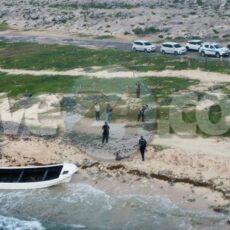
Scientists call on government, policy, NGO, and philanthropic communities to consider future conservation policies in the region
Governments must provide larger spatial protections in the Greater Caribbean for threatened, highly migratory species such as sharks, is the call from a diverse group of marine scientists led by the conservation NGO Beneath the Waves (Washington DC, USA) in collaboration with the Dutch Caribbean Nature Alliance (DCNA), in a letter published in Science on 14 February 2020.
With up to one-third of all open ocean shark species threatened extinction due to overfishing, conservation strategies that protect areas where sharks spent significant portions of their time are becoming increasingly important. In light of recent calls to protect 30% of our oceans by 2030, large marine protected areas, which can stretch from 100,000 sq. km to over 300,000 sq. km, have emerged as a popular management tool for their potential to enhance ecological processes and promote sustainable fisheries. One of the greatest benefits of these large conservation zones is their potential to conserve sharks, which travel long distances and can connect multiple jurisdictions over short time periods.
The letter in Science states that the Greater Caribbean, which boasts some of the highest rates of marine biodiversity and contains some of the most migratory shark species in the world, has been overlooked in these conversations.
“In our work providing the support to nature organizations in the Dutch Caribbean, and in working closely with conservation partners throughout the region it has become apparent that large protected areas are critical in conserve large, apex predators in the Caribbean. We have been working on a strategy to protect migratory species including sharks in the wider Caribbean but there is a need for a more concerted, coordinated effort,” commented DCNA Interim-Director Tadzio Bervoets.
Dr. Austin Gallagher, Chief Scientist at Beneath the Waves, said: “The diversity of countries sharing ocean space in the Greater Caribbean is remarkable, and we know that migratory shark species connect many of these countries along their migrations. Though there are many examples of establishing marine protected areas in the region, there are few that are big enough to encompass the space use of large sharks, such as tiger sharks which can move thousands of miles per year.”
“As a result, sharks commonly venture into risky waters where they can be picked up by commercial fishing operations – or they are commonly killed for local consumption. These catches are rarely if ever reported, which is particularly alarming,” Gallagher added.
Recent research suggests that sharks are surprisingly rare in many Caribbean nations, likely due to decades of unregulated overharvest. However, certain areas such as the Bahamas, which have banned longline fishing and protected sharks in recent decades, have benefitted from the significant socioeconomic inputs generated from live sharks in the diving industry, estimated to be over US $140 million per year.
“It has been amazing to see the push for protected areas worldwide, and in places like the Pacific. But if arresting species decline globally is a priority, then the Caribbean also should be in these discussions. It would be a shame to see the region suffer a similar fate as the Mediterranean, which has no large marine protected areas and virtually no large sharks,” Gallagher added.
“Given that the region relies on healthy oceans for a tourism product, big marine protected areas that engage the local community could be a win-win.”
###
Reference
The Letter “The Caribbean needs big marine protected areas” was published in the journal Science at https://doi.org/10.1126/science.abb0650. Co-authors include Diva Amon (Natural History Museum London/SpeSeas), Tadzio Bervoets (Dutch Caribbean Nature Alliance), Oliver Shipley (Stony Brook University), Neil Hammerschlag (University of Miami), and David Sims (Marine Biological Association of the UK/University of Southhampton).
Media contact
Jamie Fitzgerald, jamie@beneaththewaves.org,
About Beneath the Waves
Beneath the Waves is an international NGO using cutting-edge science to advance scientific discovery and catalyze ocean policy, with a focus on threatened species and ecosystems. They are actively working in the Greater Caribbean on projects that evaluate the benefits of marine protected areas for sharks. See more of their work at https://www.beneaththewaves.org

Unborn tiger shark pups which were cut out of a pregnant female on a beach in Anguilla











